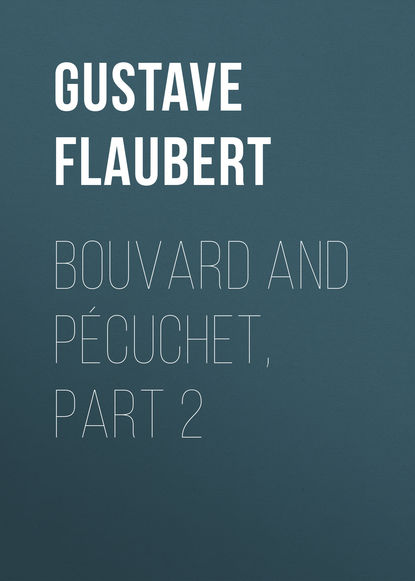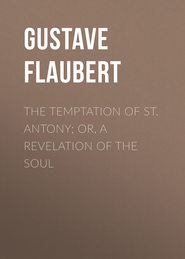По всем вопросам обращайтесь на: info@litportal.ru
(©) 2003-2024.
✖
Bouvard and Pécuchet, part 2
Настройки чтения
Размер шрифта
Высота строк
Поля
At this word, the curé jumped.
“Have you read him?”
“God forbid!”
“Nevertheless, sir, science – ”
“Sir, no one can be a scholar without being a Christian.”
Science furnished a subject for sarcasms on his part:
“Will it make an ear of corn sprout, this science of yours? What do we know?” he said.
But he did know that the world was created for us; he did know that archangels are above the angels; he did know that the human body will rise again such as it was about the age of thirty.
His ecclesiastical self-complacency provoked Bouvard, who, through want of confidence in Louis Hervieu, had written to Varlot; and Pécuchet, better informed, asked M. Jeufroy for explanations of Scripture.
The six days of Genesis mean six great epochs. The pillage of the precious vessels made by the Jews from the Egyptians must be interpreted to mean intellectual riches, the arts of which they had stolen the secret. Isaiah did not strip himself completely, nudus in Latin signifying “up to the hips”: thus Virgil advises people to go naked in order to plough, and that writer would not have given a precept opposed to decency. Ezekiel devouring a book has nothing extraordinary in it; do we not speak of devouring a pamphlet, a newspaper?
“But if we see metaphors everywhere, what will become of the facts?”
The abbé maintained, nevertheless, that they were realities.
This way of understanding them appeared disloyal to Pécuchet. He pushed his investigations further, and brought a note on the contradictions of the Bible.
“Exodus teaches us that for forty years they offered up sacrifices in the desert; according to Amos and Jeremiah they offered up none. Paralipomenon and the book of Esdras are not in agreement as to the enumeration of the people. In Deuteronomy, Moses saw the Lord face to face; according to Exodus, he could not see Him. Where, then, is the inspiration?”
“An additional ground for admitting it,” replied M. Jeufroy smiling. “Impostors have need of connivance; the sincere take no such precautions. In perplexity, have recourse to the Church. She is always infallible.”
“On whom does her infallibility depend?”
“The Councils of Basle and of Constance attribute it to the councils. But often the councils are at variance – witness that which decided in favour of Athanasius and of Arius; those of Florence and Lateran award it to the Pope.”
“But Adrian VI. declares that the Pope may be mistaken, like any other person.”
“Quibbles! All that does not affect the permanence of dogma.”
“Louis Hervieu’s work points out the variations: baptism was formerly reserved for adults, extreme unction was not a sacrament till the ninth century, the Real Presence was decreed in the eighth, purgatory recognised in the fifteenth, the Immaculate Conception is a thing of yesterday.”
And so it came to pass that Pécuchet did not know what to think of Jesus. Three Evangelists make him out to be a man. In one passage of St. John he appears to be equal to God; in another, all the same, to acknowledge himself His inferior.
The abbé rejoined by citing the letter of King Abgar, the acts of Pilate, and the testimony of the sibyls, “the foundation of which is genuine.” He found the Virgin again amongst the Gauls, the announcement of a Redeemer in China, the Trinity everywhere, the Cross on the cap of the Grand Lama, and in Egypt in the closed hands of the gods; and he even exhibited an engraving representing a nilometer, which, according to Pécuchet, was a phallus.
M. Jeufroy secretly consulted his friend Pruneau, who searched for proofs for him in the authors. A conflict of erudition was waged, and, lashed by conceit, Pécuchet became abstruse, mythological. He compared the Virgin to Isis, the Eucharist to the Homa of the Persians, Bacchus to Moses, Noah’s ark to the ship of Xithurus. These analogies demonstrated to his satisfaction the identity of religions.
But there cannot be several religions, since there is only one God. And when he was at the end of his arguments, the man in the cassock exclaimed: “It is a mystery!”
“What is the meaning of that word? Want of knowledge: very good. But if it denotes a thing the mere statement of which involves contradiction, it is a piece of stupidity.”
And now Pécuchet would never let M. Jeufroy alone. He would surprise him in the garden, wait for him in the confessional, and take up the argument again in the sacristy.
The priest had to invent plans in order to escape from him.
One day, after he had started for Sassetot on a sick call, Pécuchet proceeded along the road in front of him in such a way as to render conversation inevitable.
It was an evening about the end of August. The red sky began to darken, and a large cloud lowered above them, regular at the base and forming volutes at the top.
Pécuchet at first talked about indifferent subjects, then, having slipped out the word “martyr”:
“How many do you think there were of them?”
“A score of millions at least.”
“Their number is not so great, according to Origen.”
“Origen, you know, is open to suspicion.”
A big gust of wind swept past, violently shaking the grass beside the ditches and the two rows of young elm trees that stretched towards the end of the horizon.
Pécuchet went on:
“Amongst the martyrs we include many Gaulish bishops killed while resisting the barbarians, which is no longer the question at issue.”
“Do you wish to defend the emperors?”
According to Pécuchet, they had been calumniated.
“The history of the Theban legion is a fable. I also question Symphorosa and her seven sons, Felicitas and her seven daughters, and the seven virgins of Ancyra condemned to violation, though septuagenarians, and the eleven thousand virgins of St. Ursula, of whom one companion was called Undecemilla, a name taken for a figure; still more, the ten martyrs of Alexandria!”
“And yet – and yet they are found in authors worthy of credit.”
Raindrops fell, and the curé unrolled his umbrella; and Pécuchet, when he was under it, went so far as to maintain that the Catholics had made more martyrs than the Jews, the Mussulmans, the Protestants, and the Freethinkers – than all those of Rome in former days.
The priest exclaimed:
“But we find ten persecutions from the reign of Nero to that of Cæsar Galba!”
“Well! and the massacres of the Albigenses? and St. Bartholomew? and the revocation of the Edict of Nantes?”
“Deplorable excesses, no doubt; but you do not mean to compare these people to St. Étienne, St. Lawrence, Cyprian, Polycarp, a crowd of missionaries?”
“Excuse me! I will remind you of Hypatia, Jerome of Prague, John Huss, Bruno, Vanini, Anne Dubourg!”
The rain increased, and its drops dashed down with such force that they rebounded from the ground like little white rockets.
Pécuchet and M. Jeufroy walked on slowly, pressed close to one another, and the curé said:
“After abominable tortures they were flung into vessels of boiling water.”

















